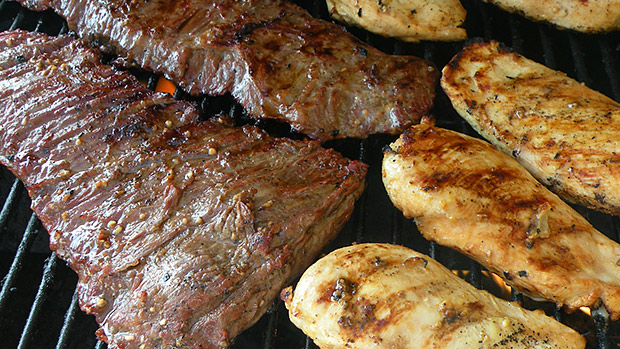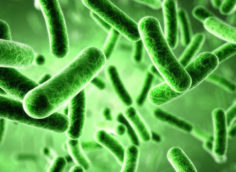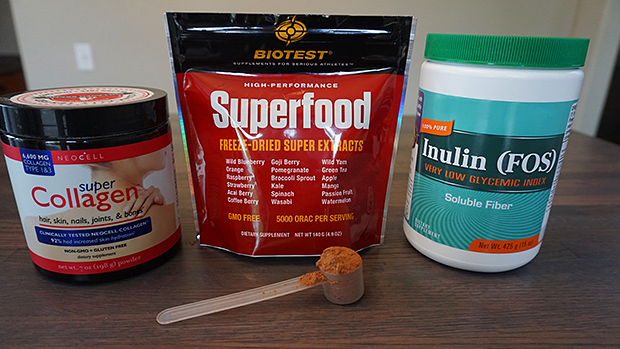Every allegedly healthy eater I've ever known habitually chooses chicken over beef because it's almost universally accepted that white meat is better for you. Nowadays, it seems only guys who wear team jerseys – one or more of the letters that spell LeBron or Brady obscured by ketchup stains – eat beef with a clear conscience.
Chickens should be pissed. They should get together and spatchcock their PR firm because it plain isn't true that they're the healthier choice. Because of this misconception, their members are being disproportionately eaten, making family reunions sad and lonely affairs.
Most of the time, chicken is actually no better or worse for you than beef, and in some situations, beef is actually the healthier choice.
The Problem With Modern Chicken
It's true that chicken used to always be a healthy choice, but that was before industrialized, mass-market chicken farms. While yesterday's chickens used to dine on crickets, grasshoppers, weeds, grasses, and seeds, today's chickens get fed the same unhealthy diet most Americans subsist on – corn, soy, and grains.
As a result, they're (chickens and humans) teeming with angry, inflammatory omega-6 fatty acids while lacking in appreciable amounts of vitamins and minerals.
While all chicken farms are prohibited from using hormones, they still, inexplicably, use antibiotics to accelerate growth. The theory is that the antibiotics allow chickens to funnel their metabolic energies into growth rather than fighting off disease, but it doesn't make much sense economically.
A study from 2007 found that the effect of using growth-promoting antibiotics was a lost value of $0.0093 per chicken, and that number is probably even more upside down today (1). But never mind that. Humans don't need to be eating additional antibiotics, anyhow.
Oddly enough, most "healthy eaters" remove the skin of the chicken, which, ironically, is probably one of the least problematic areas of the chicken. On average, the skin on an average size breast only adds about 50 calories, but about 55% of the fat in the skin is monosaturated. You know, like olive oil.
The rest of the skin, about 2.5 to 3.0 grams, is indeed saturated, but there have been at least 17 scientific reviews on the link between saturated fat and heart disease and they've come up empty.

And in This Corner, Weighing in at 1200 Pounds... Beef!
Given all of chicken's nutritional problems, beef doesn't have a particularly high bar to jump over in proving its nutritional mettle, but it has to contend against its bad rap amongst presumably healthy eaters.
The main beef against beef is again the issue of saturated fat, but as mentioned, there's no proof saturated fat causes health problems in humans. (Of course, we haven't exactly figured out how much sat fat is okay, so until we do it's still best to practice moderation.)
Nutritionally, beef is pretty much on par with chicken, although red meat is a bit higher in B vitamins and iron. Of course, industrialized beef has the same inflammatory omega-6 and antibiotic problems that chicken has, so in those areas, it's a wash between the two of them.
Which to Choose?
As it stands, a good grass-fed and grass-finished steak is much healthier than almost any grocery store or restaurant chicken. However, all bets are off if you can find 100% organic, pasture-range chicken ("free range" doesn't count because it only tells you where the birds play, and not where or what they eat) because that's the stuff closest to what your Nana and Papa ate back on the farm.
But let's assume a grassy, level playing field. If you have a choice between chicken and cattle that were raised by the same organic, pasture and grass-fed standards, opt for chicken, simply because its lifespan is shorter and it simply didn't have time to accumulate as much garbage (inadvertent pollutants, pesticides, impurities from water, etc.) from the environment.
Under those circumstances, though, beef would only come in second by the teeniest bit of a flared out nostril, but if given the choice between a mass produced chicken and a mass-produced steak, let your taste buds decide.
Reference
- Jay P. Graham, MBA, John J. Boland, PhD, and Ellen Silbergeld, PhD. "Growth Promoting Antibiotics in Food Animal Production: An Economic Analysis," Public Health Rep. 2007 Jan-Feb; 122(1): 79–87.




